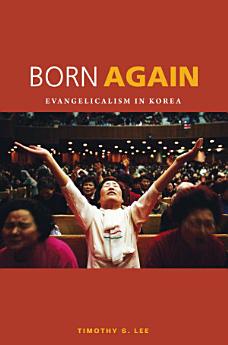Born Again: Evangelicalism in Korea
Timothy S. Lee
Dec 2009 · University of Hawaii Press
Ebook
248
Pages
family_home
Eligible
info
reportRatings and reviews aren’t verified Learn More
About this ebook
Known as Asia’s "evangelical superpower," South Korea today has some of the largest and most dynamic churches in the world and is second only to the United States in the number of missionaries it dispatches abroad. Understanding its evangelicalism is crucial to grasping the course of its modernization, the rise of nationalism and anticommunism, and the relationship between Christians and other religionists within the country.
Born Again is the first book in a Western language to consider the introduction, development, and character of evangelicalism in Korea—from its humble beginnings at the end of the nineteenth century to claiming one out of every five South Koreans as an adherent at the end of the twentieth. In this thoughtful and thorough study, Timothy S. Lee argues that the phenomenal rise of this particular species of Christianity can be attributed to several factors. As a religion of salvation, evangelicalism appealed powerfully to multitudes of Koreans, arriving at a time when the country was engulfed in unprecedented crises that discredited established social structures and traditional attitudes. Evangelicalism attracted and empowered Koreans by offering them a more compelling worldview and a more meaningful basis for association. Another factor is evangelicalisms positive connection to Korean nationalism and South Korean anticommunism. It shared in the aspirations and hardships of Koreans during the Japanese occupation and was legitimated again during and after the Korean conflict as South Koreans experienced the trauma of the war. Equally important was evangelicals’ relentless proselytization efforts throughout the twentieth century.
Lee explores the beliefs and practices that have become the hallmarks of Korean evangelicalism: kibok (this-worldly blessing), saebyok kido (daybreak prayer), and kumsik kido (fasting prayer). He concludes that Korean evangelicalism is distinguishable from other forms of evangelicalism by its intensely practical and devotional bent. He reveals how, after a long period of impressive expansion, including the mammoth campaigns of the 1970s and 1980s that drew millions to its revivals, the 1990s was a decade of ambiguity for the faith. On the one hand, it had become South Korea’s most influential religion, affecting politics, the economy, and civil society. On the other, it found itself beleaguered by a stalemate in growth, the shortcomings of its leaders, and conflicts with other religions. Evangelicalism had not only risen in South Korean society; it had also, for better or worse, become part of the establishment.
Despite this significance, Korean evangelicalism has not received adequate treatment from scholars outside Korea. Born Again will therefore find an eager audience among English-speaking historians of modern Korea, scholars of comparative religion and world Christianity, and practitioners of the faith.
Born Again is the first book in a Western language to consider the introduction, development, and character of evangelicalism in Korea—from its humble beginnings at the end of the nineteenth century to claiming one out of every five South Koreans as an adherent at the end of the twentieth. In this thoughtful and thorough study, Timothy S. Lee argues that the phenomenal rise of this particular species of Christianity can be attributed to several factors. As a religion of salvation, evangelicalism appealed powerfully to multitudes of Koreans, arriving at a time when the country was engulfed in unprecedented crises that discredited established social structures and traditional attitudes. Evangelicalism attracted and empowered Koreans by offering them a more compelling worldview and a more meaningful basis for association. Another factor is evangelicalisms positive connection to Korean nationalism and South Korean anticommunism. It shared in the aspirations and hardships of Koreans during the Japanese occupation and was legitimated again during and after the Korean conflict as South Koreans experienced the trauma of the war. Equally important was evangelicals’ relentless proselytization efforts throughout the twentieth century.
Lee explores the beliefs and practices that have become the hallmarks of Korean evangelicalism: kibok (this-worldly blessing), saebyok kido (daybreak prayer), and kumsik kido (fasting prayer). He concludes that Korean evangelicalism is distinguishable from other forms of evangelicalism by its intensely practical and devotional bent. He reveals how, after a long period of impressive expansion, including the mammoth campaigns of the 1970s and 1980s that drew millions to its revivals, the 1990s was a decade of ambiguity for the faith. On the one hand, it had become South Korea’s most influential religion, affecting politics, the economy, and civil society. On the other, it found itself beleaguered by a stalemate in growth, the shortcomings of its leaders, and conflicts with other religions. Evangelicalism had not only risen in South Korean society; it had also, for better or worse, become part of the establishment.
Despite this significance, Korean evangelicalism has not received adequate treatment from scholars outside Korea. Born Again will therefore find an eager audience among English-speaking historians of modern Korea, scholars of comparative religion and world Christianity, and practitioners of the faith.
About the author
Timothy S. Lee is assistant professor of the history of Christianity and director of the Asian (Korean) Church Studies Program at Brite Divinity School, Texas Christian University.
Rate this ebook
Tell us what you think.
Reading information
Smartphones and tablets
Install the Google Play Books app for Android and iPad/iPhone. It syncs automatically with your account and allows you to read online or offline wherever you are.
Laptops and computers
You can listen to audiobooks purchased on Google Play using your computer's web browser.
eReaders and other devices
To read on e-ink devices like Kobo eReaders, you'll need to download a file and transfer it to your device. Follow the detailed Help Center instructions to transfer the files to supported eReaders.




